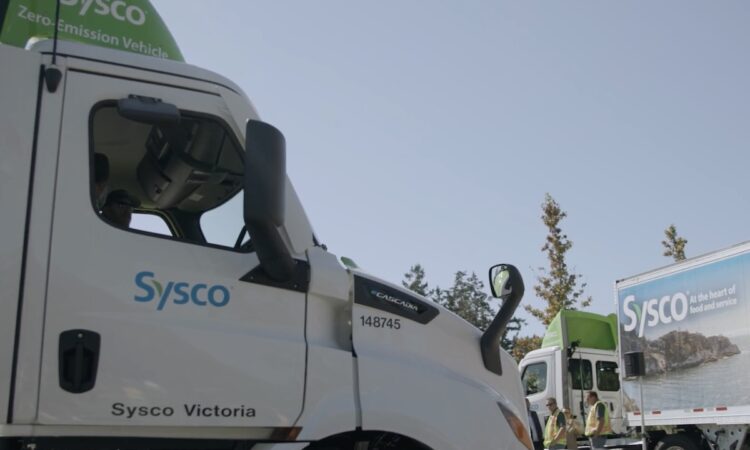Canada’s largest food distributor hopes its B.C.-based fleet will spur changes throughout the supply chain.
Sysco Canada, the country’s largest food distributor, has begun using electric tractor trucks in its Victoria operations.
Sysco serves over 1,500 business in the Victoria region, with customers that include restaurants, healthcare centres and educational institutions. The first eight electric rigs began work in early September.
“We are excited to scale our electric truck fleet into Canada and continue our journey to meet our climate goal of reducing emissions across the enterprise,” said Neil Russell, Sysco’s chief administrative officer, in a press release.
“One component of our climate goal is electrifying a portion of our fleet, and our partnership with the Government of Canada, the Government of British Columbia and BC Hydro is key to helping us achieve this.”
In total, Sysco operates 130 electric vehicles across the United States, United Kingdom, Sweden and Canada.
The Victoria electric fleet, which may increase to 10 electric trucks, is just the first wave of electric delivery vehicles that Sysco is introducing to its Canadian operations. Sysco Canada has more than 5,700 employees, operating 17 facilities and a fleet in excess of 600 trucks.
Other Canadian initiatives
In addition to beginning to rollout electric vehicles, Sysco Canada is introducing other zero-emission initiatives.
Sysco’s 2023 annual report describes two solar projects the company plans to put online this year.
First is a solar farm in Edmonton that will provide up to 75 per cent of the local Sysco delivery hub’s annual energy requirements. Meanwhile, in Calgary, Sysco will be opening a new state-of-the-art multi-purpose facility featuring high-efficiency refrigeration and HVAC with a heat capture system, extensive LED lighting, stormwater reclamation for watering greenspace and dedicated space for composting.
In addition, Sysco Canada is engaging with the federal government regarding heavy-duty electric vehicle subsidies and regulations. The federal government currently offers purchase incentives for commercial electric medium- and heavy-duty vehicles (MHDVs), but only Quebec and B.C. also offer additional provincial MHDV rebates.
In a February 2024 letter to the Treasury Board, Sysco points to a lack of commercial charging infrastructure and overregulation of autonomous vehicle testing as the biggest barriers to zero-emission vehicle adoption for its fleet.
In that submission, the company concludes that while “electric fleets in local and short haul trucking are viable,” it is not viable “for long haul trucking of heavy loads at this point, as the technology is not there.”


